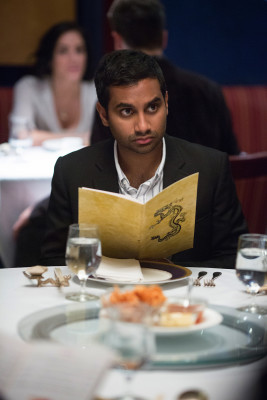
Tom Haverford has grown up.
“Master of None,” co-created by Aziz Ansari and “Parks and Recreation” producer Alan Yang, arrived on Netflix Friday as a half-hour comedy about Dev (Aziz Ansari), a 30-year old actor who’s coasting through life and exploring diversity, post-millennial problems and the reality of living in New York.
Netflix has marketed Dev as a guy “who has a lot of questions,” but just isn’t getting the right answers. The first episode revolves around Dev realizing that his friend group consists of ex-partiers turned parents who live in Montauk, New York, and host kid parties. Dev questions becoming a family man until he learns that fatherhood entails bouncy houses, racist children and fake party talk.
Ansari is definitely trying to step away from his most famous character Tom Haverford on “Parks and Recreation,” and what separates his current role from his past in network television and stand-up is the subtleness of his comedy. Instead of blunt, almost too upfront jokes about race or first-world problems, Ansari finds a way to make his audience laugh at the ridiculousness his character goes through by finding comedy in reality.
Critics have been raving over the diversity of the cast — alongside Ansari is Kelvin Yu as Brian, Dev’s right-hand man, and Lena Waithe as Denise, the wisest friend of the group. Diversity has become a major topic in entertainment, and “Master of None” excels. Instead of resorting to the archetypal stereotypes so frequently seen, the characters have no stereotypical attributes and rely on their well-written and acted selves instead.
Brian, for example, is just an average guy that dresses well and hangs out at bars. In the second episode, however, his character is also used as an example of how first-generation children don’t usually understand or reciprocate the struggle of their immigrant parents. Talking about diversity in this way makes “Master of None” relatable beyond millennial struggles. It’s topics like these that hit home for viewers who need it.
The best part of the cast is probably Dev’s parents, who also happen to be Ansari’s real-life parents. While Dev’s father Ramesh (Shoukath Ansari) steals the show as the technologically-challenged but well-intentioned dad, Brian’s father Peter (Clem Cheung) also deserves recognition for playing the Asian-American patriarch we’ve seen in life, but not on screen.
While the first episode showcases a weaker, not-worth-feeling-sorry-for Dev who watches all of his friends have kids and is internally questioning whether or not he should do the same, “Master of None” isn’t a millennial comedy. It’s a post-millennial comedy that veers away from “discovering oneself in the big city” and “the daily struggles of being a privileged twenty-something in New York”.
Instead, it’s an autobiographical tale of Ansari and Yang’s that captures Dev’s curiosity as points of reference instead of an overarching journey towards his true identity.
“Master of None” is different cinematically in ways, such as using interesting angles and sometimes shooting scenes a bit underexposed to create a grainy, gritty feeling. But Ansari uses this to his advantage, making the show a series of 30-minute films instead of a story that needs ten episodes to complete.
In essence, “Master of None” is worth watching for those who want a fresh perspective on the repetitive, overdone and mundane scripts of young adults balancing mediocre jobs and unsatisfying suitors. Dev and his friends aren’t aspirational characters or ideal images of adulthood in New York, but they are people who have found their passions and just need help working out the details.
“Master of None” is now streaming on Netflix.
























































































































